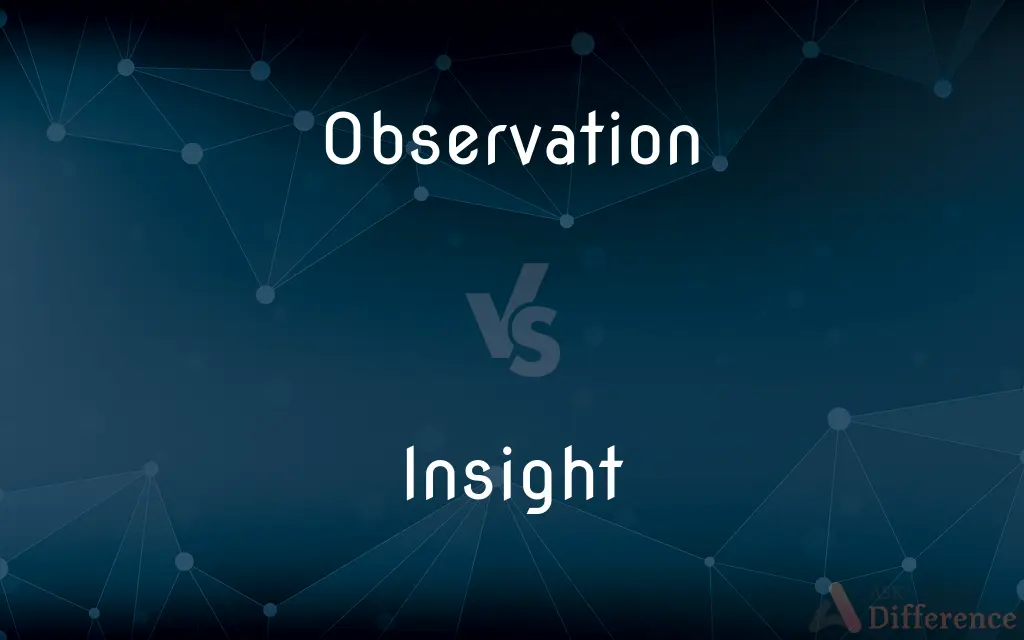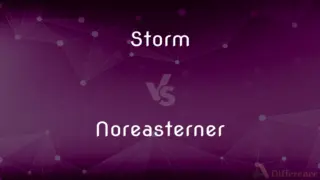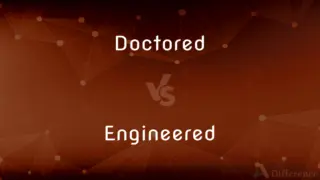Observation vs. Insight — What's the Difference?
Edited by Tayyaba Rehman — By Maham Liaqat — Updated on May 1, 2024
Observation involves gathering data through sensory experience, focusing on what is directly seen or measured; insight refers to a deeper understanding or interpretation derived from reflections on observations.

Difference Between Observation and Insight
Table of Contents
ADVERTISEMENT
Key Differences
Observation is the process of noting and recording phenomena as they are perceived, usually using tools like the eyes or scientific instruments. On the other hand, insight involves interpreting these observations and reaching conclusions that reveal deeper meanings or connections that are not immediately obvious.
Observations can be quantified and are often objective, involving precise measurements and data collection. Whereas insights are typically subjective, involving a personal or intuitive understanding of the observations.
In science, observations are used to generate data that can be tested against hypotheses. Insights, however, often guide the formation of new hypotheses or theories based on patterns and understanding derived from the data.
Observation often precedes insight in the cognitive process, as the raw data and facts collected through observation serve as the foundation for developing insights. Insight, on the other hand, represents a higher order of thinking that synthesizes and makes sense of these observations.
While observation is essential for gathering factual information, insight is crucial for making sense of this information and applying it in meaningful ways, such as solving problems or making predictions.
ADVERTISEMENT
Comparison Chart
Nature
Objective, empirical
Subjective, interpretative
Purpose
To gather data
To understand deeper meanings
Process
Involves using senses or instruments
Involves mental processes
Outcome
Data, facts
Conclusions, theories
Role in Cognition
Primary step in information gathering
Advanced cognitive process involving reflection
Compare with Definitions
Observation
The action or process of closely observing or monitoring something.
Continuous observation of the patient's condition is required.
Insight
The capacity to gain an accurate and deep understanding of someone or something.
Her insights into child psychology are very valuable.
Observation
Act of noticing or perceiving something.
The scientist made an observation of the bird's behavior.
Insight
A sudden and often novel realization of the solution to a problem.
He had a sudden insight that solved the longstanding issue.
Observation
A remark or statement based on something one has seen, heard, or noticed.
He shared his observations about the meeting's outcome.
Insight
An instance of apprehending the true nature of a thing, especially through intuitive understanding.
An insight into the poem's theme changed my perspective.
Observation
A piece of information obtained through careful watching.
The observations indicated a significant increase in temperature.
Insight
The clear or deep perception of a situation.
His insights were crucial in navigating the complex negotiation.
Observation
The practice of monitoring the behavior and activities of others.
The wildlife expert specialized in the observation of endangered species.
Insight
The understanding of the motivations or background of a specific situation or practice.
The documentary provided insight into the crisis.
Observation
Observation is the active acquisition of information from a primary source. In living beings, observation employs the senses.
Insight
Insight is the understanding of a specific cause and effect within a particular context. The term insight can have several related meanings: a piece of information the act or result of understanding the inner nature of things or of seeing intuitively (called noesis in Greek) an introspection the power of acute observation and deduction, discernment, and perception, called intellection or noesis An understanding of cause and effect based on the identification of relationships and behaviors within a model, context, or scenario (see artificial intelligence)An insight that manifests itself suddenly, such as understanding how to solve a difficult problem, is sometimes called by the German word Aha-Erlebnis.
Observation
The act of observing
Observations of a rare bird.
Insight
The capacity to gain an accurate and deep understanding of someone or something
His mind soared to previously unattainable heights of insight
Observation
The power or faculty of observing.
Insight
The ability to discern the true nature of a situation, especially by intuition.
Observation
The fact of being observed
Kept the suspect under observation.
Insight
A perception produced by this ability.
Observation
The act or process of perceiving something, such as a phenomenon, often by means of an instrument, and making a record of the resulting information.
Insight
A sight or view of the interior of anything; a deep inspection or view; introspection; frequently used with into.
Observation
The result or record of such an act or process
A meteorological observation.
Insight
Power of acute observation and deduction
Observation
An inference, judgment, or remark that is made by observing
Made some sharp observations about the movie.
Insight
(marketing) Knowledge (usually derived from consumer understanding) that a company applies in order to make a product or brand perform better and be more appealing to customers
Observation
The act of observing, and the fact of being observed (see observance)
Insight
Intuitive apprehension of the inner nature of a thing or things; intuition.
Observation
The act of noting and recording some event; or the record of such noting.
Insight
(artificial intelligence) An extended understanding of a subject resulting from identification of relationships and behaviors within a model, context, or scenario.
Observation
A remark or comment.
Insight
(psychiatry) An individual's awareness of the nature and severity of one's mental illness.
Observation
A judgement based on observing.
Insight
A sight or view of the interior of anything; a deep inspection or view; introspection; - frequently used with into.
He had an insight into almost all the secrets of state.
Observation
Performance of what is prescribed; adherence in practice; observance.
Insight
Power of acute observation and deduction; penetration; discernment; perception.
Quickest insightIn all things that to greatest actions lead.
Observation
A regime under which a subject is routinely observed.
Insight
Clear or deep perception of a situation
Observation
Philosophically as: the phenomenal presence of human being existence.
Insight
A feeling of understanding
Observation
(stochastics) A realization of a random variable.
Insight
The clear (and often sudden) understanding of a complex situation
Observation
The act or the faculty of observing or taking notice; the act of seeing, or of fixing the mind upon, anything.
My observation, which very seldom lies.
Insight
Grasping the inner nature of things intuitively
Observation
The result of an act, or of acts, of observing; view; reflection; conclusion; judgment.
In matters of human prudence, we shall find the greatest advantage in making wise observations on our conduct.
Observation
An expression of an opinion or judgment upon what one has observed; a remark.
To observations which ourselves we makeWe grow more partial for the observer's sake.
Observation
Performance of what is prescribed; adherence in practice; observance.
We are to procure dispensation or leave to omit the observation of it in such circumstances.
Observation
The act of recognizing and noting some fact or occurrence in nature, as an aurora, a corona, or the structure of an animal.
Observation
The act of making and recording a measurement
Observation
The act of observing; taking a patient look
Observation
Facts learned by observing;
He reported his observations to the mayor
Observation
The act of noticing or paying attention;
He escaped the notice of the police
Observation
A remark expressing careful consideration
Common Curiosities
How does insight differ from simple understanding?
Insight involves a deeper, often sudden understanding of a complex situation, typically providing novel solutions or perspectives, whereas simple understanding might only involve basic knowledge of facts or processes.
How important are observations in scientific research?
Observations are crucial in scientific research as they provide the empirical data needed to test hypotheses and theories.
What is the primary function of observation?
The primary function of observation is to gather data and information about the environment or a specific phenomenon.
Is insight always based on observation?
While insights can be based on observations, they can also come from other sources such as experiences, theoretical knowledge, or intuitive thinking.
What role does technology play in enhancing observations?
Technology, such as digital cameras, sensors, and analytical software, enhances the accuracy, range, and convenience of making observations.
Can observation lead to insights?
Yes, observations often provide the necessary data from which insights can be derived, especially when patterns or anomalies are analyzed.
How can insights be beneficial in business?
In business, insights can help identify market trends, improve products or services, and create effective strategies.
What tools are commonly used for making observations?
Common tools include telescopes for astronomical observations, microscopes for biological observations, and sensors or meters for various scientific measurements.
Can insights be wrong?
Yes, insights can be incorrect if based on faulty observations, biases, or incomplete information.
What is an example of an insight in literature?
An example would be understanding the deeper themes of human nature and societal critique in George Orwell's "1984".
Share Your Discovery

Previous Comparison
Storm vs. Noreasterner
Next Comparison
Doctored vs. EngineeredAuthor Spotlight
Written by
Maham LiaqatEdited by
Tayyaba RehmanTayyaba Rehman is a distinguished writer, currently serving as a primary contributor to askdifference.com. As a researcher in semantics and etymology, Tayyaba's passion for the complexity of languages and their distinctions has found a perfect home on the platform. Tayyaba delves into the intricacies of language, distinguishing between commonly confused words and phrases, thereby providing clarity for readers worldwide.
















































